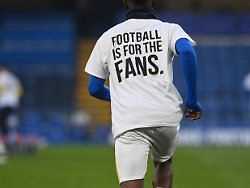Wednesday April 21, 2021
Super League is buried
Fans counter the “dirty dozen”
Boris Johnson has been complaining about the planned Super League for days. In football-mad England, the prime minister has an overwhelming majority behind him. The fans run storm against the billion dollar project. Your protest works.
They cheer as if their Chelsea FC had won an important football game. The players of the German coach Thomas Tuchel have not even started their game against Brighton. But when the news spreads in social networks that the blues are getting out of the controversial Super League, the fans in front of the stadium are in each other’s arms – despite the pandemic. A few hours later, Manchester City confirmed the withdrawal as the first Super League participant, after which the other clubs on the island will also fall. Liverpool FC, Manchester United, Tottenham Hotspur, Arsenal FC – they all say “Sorry” and stamp their plans out of the elite league. The fans feel like winners.
For two days they protested loudly against the Super League, their own, otherwise so much loved clubs demonized for their planned participation in a closed event for the financially strongest clubs. The emotions in the self-proclaimed motherland of football boiled high. Ex-star striker Alan Shearer called on the Premier League to throw a “hand grenade”, there was talk of “war”, Jürgen Klopp’s Liverpool FC was the focus of criticism. The plans of the “dirty dozen”, as the twelve founding members are called by the British press, generate massive resistance and martial words. Fans, ex-players and the media are outraged, Prime Minister Boris Johnson announced in the “Sun” that he would show the “ridiculous” billion dollar project the red card. His sports minister Oliver Dowden presented drastic ideas to prevent the “Big Six”, the top English clubs, from participating. Even Prince William – president of the national association FA – intervened.
Grinding teeth at Klopp
On Tuesday evening, the massive pressure from all sides seemed to be having an effect. Even before Manchester City had sent out its message, critics such as ex-national player Gary Neville celebrated the end of the billion-dollar project on Twitter. The German coach of the English champions FC Liverpool, Jürgen Klopp, was clear to see how torn he is between his personal aversion to the Super League and his loyalty to his employer. Liverpool had also joined the plans. Yes, he is sticking to the fact that he rejects the Super League, but he does not want to resign, Klopp said on Monday evening.
Liverpool’s James Milner became the first professional of one of the rebel clubs to publicly oppose the plans after the meager 1-1 at Leeds United, while the Leeds pros protested against the plan with T-shirts. “Earn it” was there under the Champions League logo. Fans burned a Liverpool shirt in front of the stadium and there were protest posters on the home stadium on the legendary Anfield Road. “Shame”, “Theft”, “Destruction”: The British newspapers covered their front pages with accusations against the Super League.
Six clubs from the English elite league wanted to participate in the new league. With the exception of Spurs, which belong to a British investment company, billionaires from the USA, Russia and the United Arab Emirates are the owners of the traditional clubs. Most of the other top division clubs are also owned by corporations or wealthy individuals. Unlike in Germany, where corporations and private individuals – officially – are not allowed to hold a majority in a football club because of the 50 + 1 rule, the procedure has been accepted in England for years.
Business model saved
But the Super League push threatens to change the entire football landscape. On the one hand, the ownership structure could change. Sports Minister Dowden threatened the clubs with the “German model” of fan majority participation. On the other hand, the Premier League would be in ruins without the Big Six. Any club would have threatened tens of millions of pounds in TV money if the strongest teams were not involved. The interest in the Premier League will decrease significantly when the teams, which have millions of fans in important, financially strong markets such as China or Arab countries, are no longer there, warned experts. And the exodus of the top clubs will also have an impact on the other leagues because solidarity payments will not be made.
The withdrawal of their clubs is now giving the Premier League a sigh of relief. The business model should be saved. Because without the English clubs, the model has failed. The pressure from the British government to bring the clubs into line with massive deterrents also had an effect. Measures proposed by Minister Dowden in Parliament included extra taxes, a reduced number of security guards on match days and a denial of work permits for newcomers from abroad. In doing so, the government put itself under great pressure. Anything other than a U-turn by the six clubs would have been viewed as a political failure. In the night of Wednesday the subject was settled.
.
